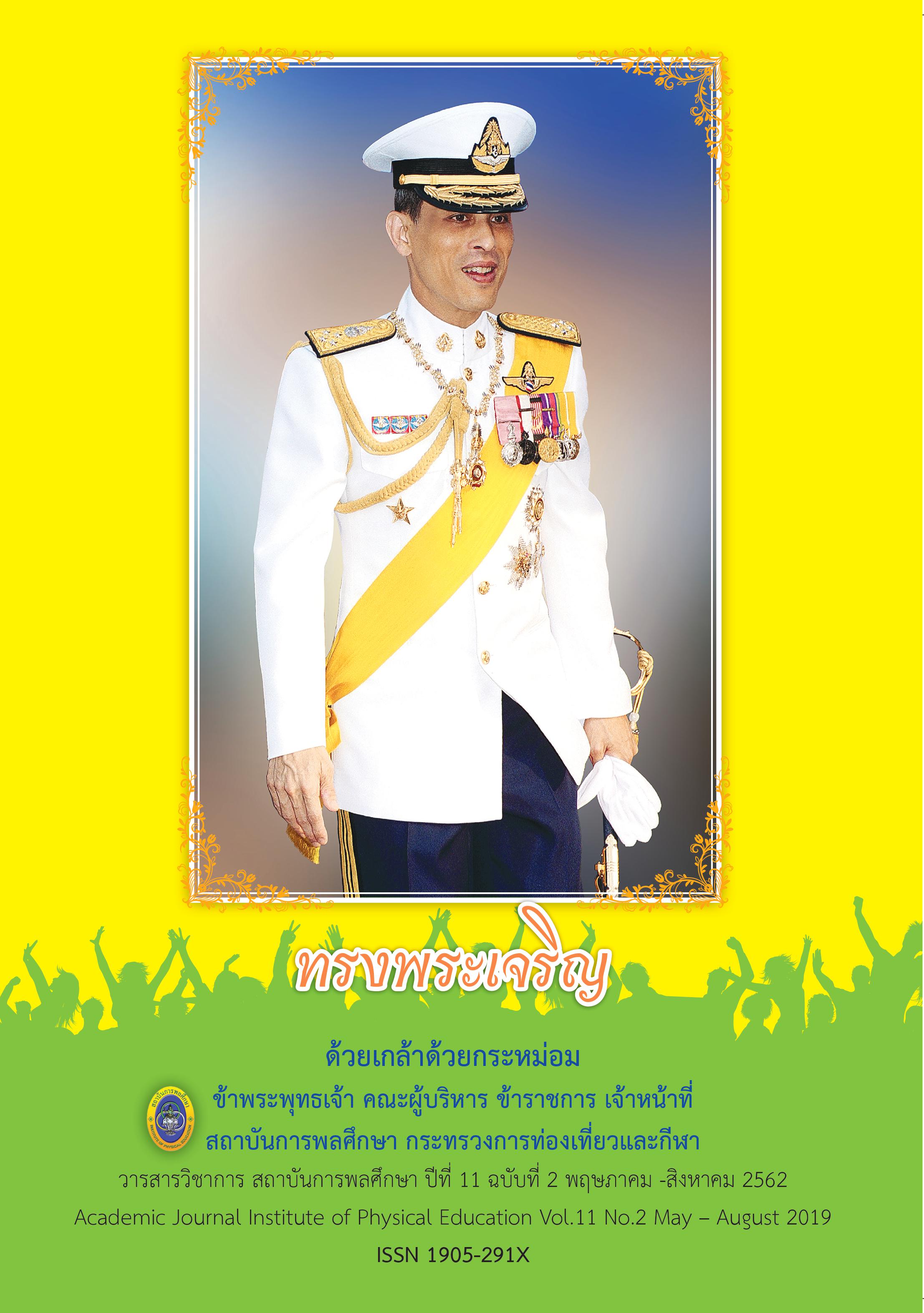INFLUENCES OF ORGANIZATIONAL CULTURE TOWARDS THAILAND VOLLEYBALL ASSOCIATION’S ADMINISTRATIVE EFFECTIVENESS
Main Article Content
Abstract
The objectives of this research were 1) to study organizational cultures and administrative effectiveness of Thailand Volleyball Association and 2) to study influences of organizational culture towards Thailand Volleyball Association’s administrative effectiveness. A mixed method was used in this research, taking both qualitative and quantitative methodologies. For qualitative method, an interview form was used in the interviews and focus group of 30 Key informants. For quantitative method, a questionnaire was used to gather data from a sample group of 1,140 people. Data were analyzed using content analysis and qualitative analysis and presented in Average value and Stepwise Multiple Regression Analysis. Research results were concluded as follows: 1. Organizational cultures of Thailand Volleyball Association consist of (1) Participation in administration, which comprises personnel competency development, teamwork, participation in leader selection, (2) Working with unity, which comprises acceptance and engagement, cooperation and integration and transparent
administration, (3) Adaptation to present time, which comprises personnel learning, satisfaction of stakeholders and making changes through competition, (4) Commitment to achieve the mission, which comprises goals and objectives, strategic direction and commitment and visions; 2. Administrative effectiveness of Thailand Volleyball Association consists of (1) Effectiveness in organizational administration, which comprises acceptance of the Association’s personnel, acceptance in administration and recognition from Sports Authority of Thailand and Federation International de Volleyball, (2) Effectiveness in competition
administration, which comprises success of the national team, success of national competition system and success of organization and participation of international competition (3) Effectiveness in administration of human resources development, which comprises success of referee development, success of trainer development and success of athlete development; 3. Influence of organizational cultures has positive relation to the administrative effectiveness
of Thailand Volleyball Association. In terms of organizational administration, a prediction for effectiveness is 63 percent with statistical significance at 0.05. In terms of competition administration, a prediction for effectiveness is 56 percent with statistical significance at 0.05. Lastly, in terms of human resource development administration, a prediction for effectiveness is 57 percent with statistical significance at 0.05.
Article Details
The published article is a copyright of the Academic Journal of Thailand National Sports University. The passage appeared in each article in this academic journal is a perspective of each author which is not related to the journal. Each author is required to be responsible for all components of his/her own article. If there are any mistakes, each author must be responsible for those mistakes on his/her own.
References
Achua,C.F.,& Lussier, R.N. (2010). Effective Leadership. (4th Edition) Canada: South-Western.
Anderson, Judith A. (2000). Explanatory Roles of Mission and Culture : Organizational Effectiveness in Tennessee’s Community Colleges. Dissertation, Doctor of Education. University of Memphis. Photocopied.
Denison, Denial R. (1990). Corporate Culture and Organizational Effectiveness. New York: John Wiley & Sons.
Domrong Phetploynin. (2009). Female Volleyball Team Management in 37th Sport Authority of Thailand. Thesis, Master of Education.Naresuan University. (In Thai).
Eisinga R, Te Grotenhuis M, Pelzer B. (2012). The reliability of a two-item scale: Pearson, Cronbach or Spearman-Brown?. International Journal of Public Health. 58(4),637-42.
Hsu, Chin-Hsien. (2002). A Structural Equation Modeling Analysis of Transformational Leadership, Organizational Culture and organizational Effectiveness in Taiwanese Sport/Fitness Organizations. Dissertation Doctor of Sport Management. United States Sports Academy.
Hellriegel, D., Jackson, S.E., Slocum, J., Staude, G., Amos, T., Klopper, H.B., Ivancevich, J.M., Lorenzi, P., Skinner, S.J., & Crosby, P.B. (2001). Management: quality and
competitiveness. Chicago: Richard D Irwin.
McShane, Steven L., & Von Glinov, Mary Ann. (2010). Organizational Emerging Knowledge and Practice for The Real World. New York: McGraw Hill.
Nuntiya Noichun. (2007). Organizational Culture and the Efficiency in Higher Educational Administration. Dissertation, Doctor of Philosophy, Silpakorn University. (In Thai).
Prapot Yamtim. (2007). The Relationships between Organizational Culture and Effectiveness of Educational Administration as Perceived by Administrators and
Teachers in Primary Schools. Dissertation, Doctor of Philosophy. Ramkhamhaeng University. (In Thai).
Ronna CT, Laurie C. (2003). Indexes of item-objective congruence for multidimensional items. International Journal of Testing. 3(2), 163-171.
Schein, Edgar H. (2010). Organizational Culture and Leadership. 4th ed. San Francisco: Jossey–Bass.


